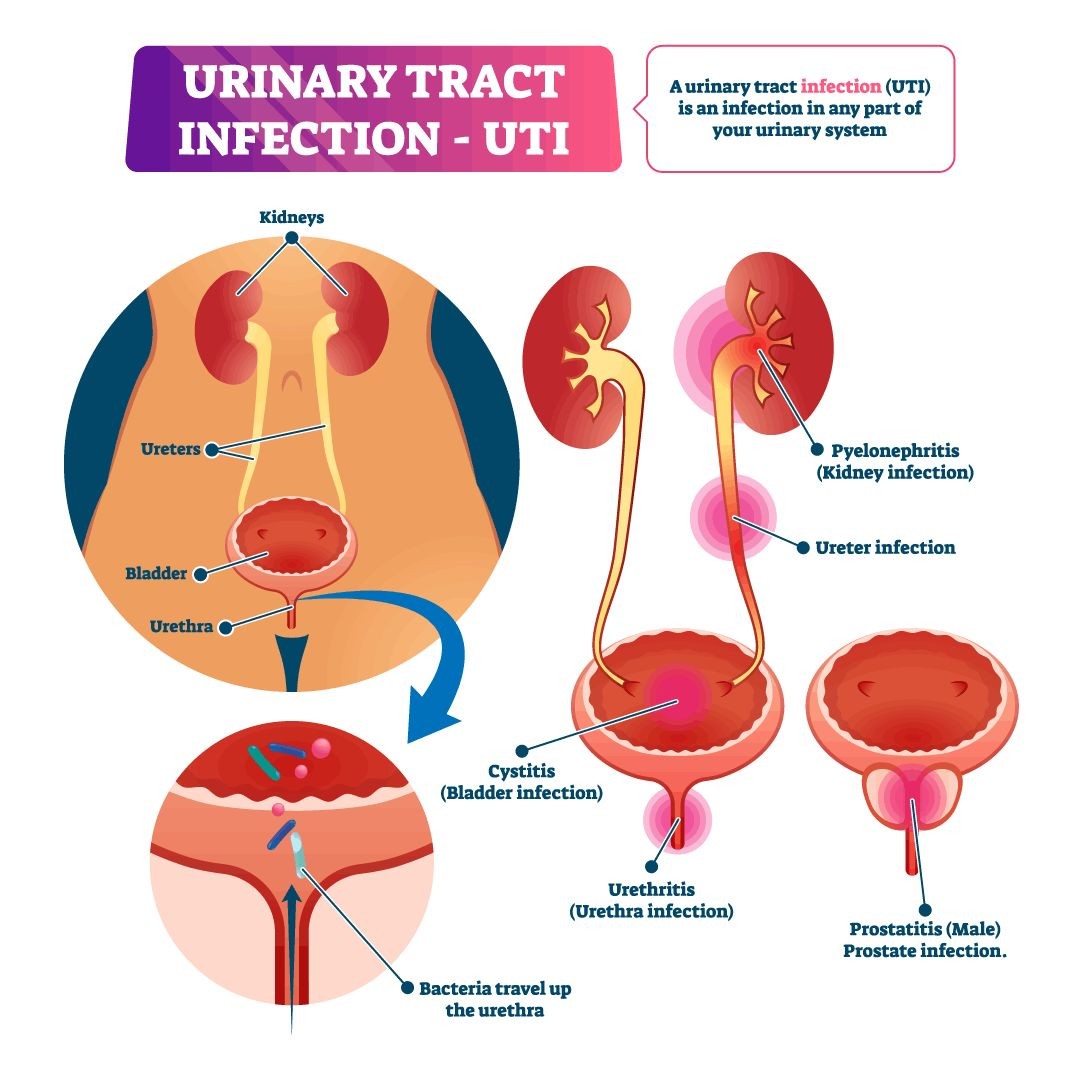
Contents
How to Determine if a UTI Has Reached Your Kidneys?
A urinary tract infection (UTI) is an infection in any part of the urinary tract. Signs of a UTI spreading to the kidneys include chills, high fever, nausea, vomiting, and other symptoms.
The urinary tract consists of two kidneys, two ureters that carry urine from the kidneys, the urinary bladder, which receives urine from the ureters, and the urethra, from which urine exits the body. Typically, when we talk about a UTI, we are referring to an infection in the urinary bladder. Can a UTI progress to a kidney infection?
This is a significant concern because kidney infections can be dangerous. The kidneys are responsible for removing waste from the body, regulating the balance of water and electrolytes like sodium and potassium, and performing other important functions.
Ordinarily, urine is sterile, meaning the kidneys, ureters, urinary bladder, and urethra do not have any bacteria or other germs. A UTI can occur in any part of the urinary system. Urinary infections are common, with more than half of all women experiencing at least one in their lifetime.
Most urinary tract infections are ascending infections, where bacteria enters through the urethra and travels up to the bladder. When the infection affects the bladder, it is called cystitis. UTIs are four times more common in women than in men, primarily because women have a shorter urethra.
A UTI is an infection in any part of the urinary tract, with bladder infections being the most common, referred to as cystitis. Infections limited to the urethra are called urethritis. A kidney infection, known as pyelonephritis, is also a type of UTI.
Symptoms of Cystitis
The usual symptoms of a urinary bladder infection include:
- Burning or pain during urination
- Frequent urge to urinate, with minimal urine release
- Pressure or pain in the lower belly
- Cloudy or reddish urine
- Strong-smelling urine
- Fatigue and general discomfort, possibly with a low-grade fever
How Do Kidney Infections Occur?
Normally, a bladder infection cannot reach the kidneys because the urinary tract has a one-way flow. Urine flows from the kidneys to the bladder and then exits the body. Any bacteria in the urinary tract are usually flushed out.
Kidney infections occur when bacteria travel from the bladder upwards to the kidneys. This typically happens when a condition called vesicoureteral reflux (VUR) is present. With VUR, urine flows back from the bladder into one or both ureters, often during urination.
Kidney infections can also develop when bacteria in the blood reach the kidneys and cause an infection (hematogenous UTI). This is rare in adults and usually occurs after surgery.
Signs of Kidney Infection
Kidney infections are a type of UTI, but the symptoms vary slightly from those of a bladder infection. Symptoms of kidney infections include:
- Chills and shivering
- High fever
- Nausea and vomiting
- Pain in the back, flanks, or groin
- Frequent and painful urination
- Dark, cloudy, or bloody urine, often with a foul odor
When a UTI spreads to the kidneys, the symptoms become severe. The fever is often very high, and the individual may feel extremely ill. People over 65 may experience different symptoms, such as confusion, hallucinations, slurred speech, increased incontinence, and shivering.
Diagnosing a Kidney Infection
If you experience any symptoms of a UTI, it is important to see a doctor. They will ask you to provide a urine sample for testing. The laboratory will analyze your urine chemically and under a microscope. UTIs can cause an increase in pus cells and blood in the urine. Large amounts of blood are more common in cystitis than in kidney infections, but the presence of white blood cell casts can indicate a kidney infection.
A sterile container is used to collect urine for a culture, which takes three to five days. This test helps identify the bacteria causing the infection and determines which antibiotics are likely to be effective. If your symptoms do not improve with initial treatment, the culture results will guide further treatment decisions.
Your physician may order additional tests, such as blood tests to check for infection and kidney function. Sometimes, ultrasounds, CT scans, or MRIs may be necessary to assess kidney function, often using contrast media injections.
Is a Kidney Infection an Emergency?
Yes, a kidney infection is a serious condition. The kidneys are vital organs that can be rapidly damaged by bacteria. Without prompt treatment, permanent kidney damage can occur.
Kidney infections (pyelonephritis) can lead to high blood pressure and kidney failure. The infection can also cause scarring in the kidneys, which can progress to chronic kidney disease and eventually renal failure. Renal failure requires treatment through dialysis or a kidney transplant. Diagnosing and treating kidney infections promptly is crucial.
QUESTION
Treating a UTI
When symptoms suggest a UTI, a physician will order tests and likely begin treatment before receiving the results.
The most important part of treatment is antibiotics. Since infections can result in permanent damage, antibiotics are prescribed as soon as a urine sample is collected. Completing the full course of antibiotics is essential for a complete cure. Some antibiotics are administered via injection or intravenous infusion. In more severe cases, hospitalization may be required for treatment.
If you feel better after completing the treatment, further testing may not be necessary. However, if symptoms return within a few days of completing the treatment, repeat testing may be advised.
If recurrent kidney infections are an issue, a low dose of antibiotics may be prescribed to be taken every night. Additional doses after sexual intercourse may also be recommended.
Preventing UTIs
Urinary tract infections are common and can become serious if they reach the kidneys. Here are some preventive measures:
- Urinate frequently, avoiding holding urine for more than 3 to 4 hours.
- Urinate before and after sexual intercourse.
- After using the toilet, wipe your genital area from front to back. This prevents the spread of bacteria from the anal area to the urethra.
- Drink 6 to 8 glasses of water and other fluids daily.
- Choose showers over baths, and limit baths to 30 minutes or less.
- Change out of wet or damp bathing suits or gym clothes promptly.
What you should avoid:
- Do not delay urinating when you feel the urge.
- Take your time and fully empty your bladder; avoid rushing.
- Avoid using scented soap and vaginal douches.
- Avoid consuming sugary foods and alcoholic drinks.
- Do not use female condoms or diaphragms with spermicidal creams.
Conclusion
Kidneys are vital organs that can be harmed by infections. If you have a UTI, be aware of signs that it may have spread to your kidneys. Such infections can lead to permanent kidney damage. Early and complete treatment is necessary to prevent a UTI from progressing to a kidney infection.
Sources:
American Academy of Family Physicians: "Urinary Tract Infection."
American Family Physician: "Diagnosis and Treatment of Acute Pyelonephritis in Women."
National Health Service: "Urinary tract infections (UTIs)."
National Institutes of Diabetes and Digestive and Kidney Diseases: "Definition & Facts of Kidney Infection (Pyelonephritis)."
National Institutes of Diabetes and Digestive and Kidney Diseases: "Symptoms & Causes of Kidney Infection (Pyelonephritis)."
National Institutes of Diabetes and Digestive and Kidney Diseases: "Treatment for Kidney Infection (Pyelonephritis)."
National Institutes of Health: "Bladder Infection (Urinary Tract Infection—UTI) in Adults."
National Library of Medicine: "Urinary Tract Infections."
US Department of Health and Human Services: "Urinary Tract Infections."


